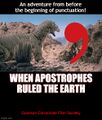Cooper Black, Forensic Typographer: Difference between revisions
No edit summary |
No edit summary |
||
| (20 intermediate revisions by the same user not shown) | |||
| Line 1: | Line 1: | ||
'''''Cooper Black, Forensic Typographer''''' is | [[File:Cooper Black, Forensic Typographer.jpg|thumb|Earliest known poster for '''''Cooper Black, Forensic Typographer'''''.]]'''''Cooper Black, Forensic Typographer''''' is an American dramatic police typography television series loosely based on the life of pioneering forensic typographer "Supercool" Drew Cabo. | ||
== | == Hashtags == | ||
* " | * <nowiki>#TypographicEntertainmentNetwork</nowiki> | ||
== Anagrams == | |||
"Supercool" Drew Cabo is an angram of "Oswald Bruce Cooper". | |||
== In the News == | == In the News == | ||
<gallery> | <gallery> | ||
File:Fanfare for the Comic Sans.jpg|link=Fanfare for the Comic Sans|'''''[[Fanfare for the Comic Sans]]''''' is a musical-typographical work by the American composer-typographer Aaron Copland. | |||
File:Double Space Boomers.jpg|link=Double Space Boomers|'''''[[Double Space Boomers]]''''' is a literary drama thriller film about a traumatized Vietnam War veteran (Charlie Sheen) who turns to copyediting for solace. | |||
File:When Apostrophes Ruled the Earth.jpg|link=When Apostrophes Ruled the Earth|'''''[[When Apostrophes Ruled the Earth]]''''' is a 1970 British science grammar film. This was the third in Hammer's "Sign Girl" series, preceded by ''One Million Signifiers B.C.'' (1966) and ''Prehistoric Writing'' (1967); it was followed by ''Cuneiform the World Forgot'' (1971). | |||
File:When You're Smiley.jpg|link=When You're Smiley|'''''[[When You're Smiley]]''''' is a 2018 spy novel by John le Carré. Plot: spymaster George Smiley is called out of retirement to investigate the death of Louis Armstrong. Smiley learns that Armstrong had discovered information that will lead to a final confrontation with their mutual nemesis, the Soviet intelligence officer Karla. | |||
</gallery> | </gallery> | ||
== Fiction cross-reference == | == Fiction cross-reference == | ||
* ''[[Double Space Boomers]]'' | |||
* [[Drew Cabo]] | * [[Drew Cabo]] | ||
* ''[[Fanfare for the Comic Sans]]'' | |||
* [[Gnomon algorithm]] | * [[Gnomon algorithm]] | ||
* [[Gnomon Chronicles]] | * [[Gnomon Chronicles]] | ||
* [[Kerning]] | |||
* ''[[When Apostrophes Ruled the Earth]]'' | |||
== Nonfiction cross-reference == | == Nonfiction cross-reference == | ||
* [[Oswald Bruce Cooper (nonfiction)]] - (April 13,[1] 1879 – December 17, 1940) - American type designer, lettering artist, graphic designer, and teacher of these trades. | |||
* [[Cooper Black (nonfiction)]] | * [[Cooper Black (nonfiction)]] | ||
* [[Karl Jones (nonfiction)]] | * [[Karl Jones (nonfiction)]] | ||
== External links == | == External links == | ||
* [https://en.wikipedia.org/wiki/Cooper_Black Cooper Black] @ Wikipedia | |||
* [https://www.youtube.com/watch?v=Zu91meda2I8 Why this font is everywhere] @ YouTube | |||
* [https://boingboing.net/2020/06/16/why-the-cooper-black-typeface.html Why the Cooper Black typeface is everywhere] @ Boing Boing | * [https://boingboing.net/2020/06/16/why-the-cooper-black-typeface.html Why the Cooper Black typeface is everywhere] @ Boing Boing | ||
| Line 30: | Line 50: | ||
*** ''Design literacy: Understanding graphic design''. Steven Heller, 2014. | *** ''Design literacy: Understanding graphic design''. Steven Heller, 2014. | ||
*** ''The Book of Oz Cooper: an Appreciation of Oswald Bruce Cooper''. Society of Typographic Arts, 1949. | *** ''The Book of Oz Cooper: an Appreciation of Oswald Bruce Cooper''. Society of Typographic Arts, 1949. | ||
=== Social media === | |||
* [https://twitter.com/GnomonChronicl1/status/1689647439123488773 Post] @ Twitter (10 August 2023) | |||
* [https://twitter.com/GnomonChronicl1/status/1626200887684128768 Post] @ Twitter (16 February 2023) | |||
* [https://twitter.com/GnomonChronicl1/status/1514398745709920258 Post] @ Twitter (13 April 2022) | |||
* [https://twitter.com/GnomonChronicl1/status/1513279981815840769 Post] @ Twitter (10 April 2022) | |||
[[Category:Fiction (nonfiction)]] | [[Category:Fiction (nonfiction)]] | ||
[[Category:Cooper Black (nonfiction)]] | |||
[[Category:Typography (nonfiction)]] | |||
[[Category:Television]] | [[Category:Television]] | ||
{{DISPLAYTITLE:''{{FULLPAGENAME}}''}} | |||
Latest revision as of 12:46, 9 November 2024
Cooper Black, Forensic Typographer is an American dramatic police typography television series loosely based on the life of pioneering forensic typographer "Supercool" Drew Cabo.
Hashtags
- #TypographicEntertainmentNetwork
Anagrams
"Supercool" Drew Cabo is an angram of "Oswald Bruce Cooper".
In the News
Fanfare for the Comic Sans is a musical-typographical work by the American composer-typographer Aaron Copland.
Double Space Boomers is a literary drama thriller film about a traumatized Vietnam War veteran (Charlie Sheen) who turns to copyediting for solace.
When Apostrophes Ruled the Earth is a 1970 British science grammar film. This was the third in Hammer's "Sign Girl" series, preceded by One Million Signifiers B.C. (1966) and Prehistoric Writing (1967); it was followed by Cuneiform the World Forgot (1971).
When You're Smiley is a 2018 spy novel by John le Carré. Plot: spymaster George Smiley is called out of retirement to investigate the death of Louis Armstrong. Smiley learns that Armstrong had discovered information that will lead to a final confrontation with their mutual nemesis, the Soviet intelligence officer Karla.
Fiction cross-reference
- Double Space Boomers
- Drew Cabo
- Fanfare for the Comic Sans
- Gnomon algorithm
- Gnomon Chronicles
- Kerning
- When Apostrophes Ruled the Earth
Nonfiction cross-reference
- Oswald Bruce Cooper (nonfiction) - (April 13,[1] 1879 – December 17, 1940) - American type designer, lettering artist, graphic designer, and teacher of these trades.
- Cooper Black (nonfiction)
- Karl Jones (nonfiction)
External links
- Cooper Black @ Wikipedia
- Why this font is everywhere @ YouTube
- Why the Cooper Black typeface is everywhere @ Boing Boing
- Why this font is everywhere - How Cooper Black became pop culture’s favorite font.
- There’s a typeface that has made a resurgence in the last couple of years. It’s appeared on hip hop album covers, food packaging, and advertising. Perhaps you know it from the Garfield comics, Tootsie Roll logo, or the Pet Sounds album cover by the Beach Boys. It's called Cooper Black, and its popularity and ubiquity has never waned in the hundred years since it was first designed. In the video above, Steven Heller and Bethany Heck tell the story of Cooper Black and deconstruct all the reasons it's been pop culture's favorite font for so long.
- Sources:
- Design literacy: Understanding graphic design. Steven Heller, 2014.
- The Book of Oz Cooper: an Appreciation of Oswald Bruce Cooper. Society of Typographic Arts, 1949.
Social media
- Post @ Twitter (10 August 2023)
- Post @ Twitter (16 February 2023)
- Post @ Twitter (13 April 2022)
- Post @ Twitter (10 April 2022)




